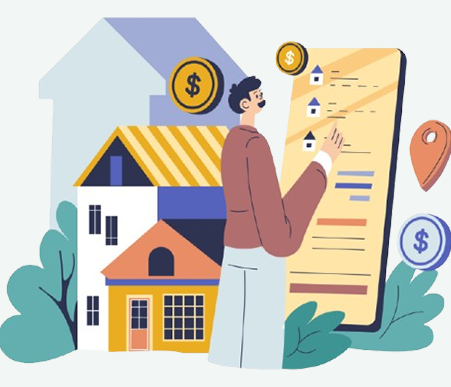Online Housing Loan Agent/Consultants in Coimbatore
Homeownership constitutes one of the largest monetary decisions that numerous families, along with individuals, undertake. Customers use loans for purchasing real estate properties, along with residential buildings and the acquisition of land, because such financial assistance makes real estate acquisition possible. Home loan options exist in available types such as purchase loans combined with renovation loans and construction loans, together with refinancing options. The loan structure features adjustable payment schedules together with good rates that assist homeowners in maintaining stable finances and managing monthly costs. The clinching factors for a home loan approval include your credit score and regular income, combined with the current market assessment of the purchased property.

Finmarra makes it a priority to accommodate the diverse requirements of its home loan borrowers. The company accomplishes this by developing loan solutions that match individual requirements. A financial services background provides Finmarra with the expertise to create borrowing programs that improve financial transparency throughout the loan application process. The company links customers to leading lenders who provide excellent loan terms, resulting in improved opportunities for dream house ownership. From initial homebuyers to existing loan refinancers, Finmarra provides an expert team support system throughout the entire process. Your smooth path to buying or refinancing your home is their primary objective at Finmarra. Finmarra provides dependable advice and support services to deliver you secure choices in the housing market.
Home Loan Eligibility Criteria For Salaried & Self-Employed
Banks and lenders check a few things to see if you qualify for a home loan. Here’s what they focus on:
- Age: Most places lend to folks between 21 and 60 years old, though some banks might tweak those age limits a bit.
- Income: You need to show you’ve got a steady paycheck or business income to cover loan payments. More income usually means you can borrow more.
- Job Security: Lenders like it when you’ve stuck with the same job for a while—it shows you’re financially stable.
- Home’s Value: The price of the house you want to buy matters a lot. Banks typically lend a chunk of the property’s market value.
Paperwork You’ll Need to Gather for Home Loan
To make your loan application smooth and quick, have these documents ready to go:
- ID Proof: Grab something official like a passport, voter ID, or driver’s license to prove who you are.
- Address Proof: Things like electric bills, bank statements, or a rental agreement can show where you live.
- Income Proof: If you’re salaried, bring recent pay stubs, tax returns, or Form 16. Self-employed? You’ll need tax filings and business financials.
- Property Docs: Get the sale agreement, title deed, and a no-objection certificate from the seller or builder for the house you’re buying.
What’s This Loan-to-Value (LTV) Ratio?
The loan-to-value (LTV) ratio tells you how much of the home’s value the bank will cover. It’s a big deal for approval.
- How It Works: A lower LTV means you pay more upfront as a down payment. A higher LTV means the bank chips in more. Most ratios sit between 75% and 90%, depending on your finances and loan type.
- Why It’s a Factor: If the LTV is high, the bank’s taking a bigger risk. That could mean higher interest rates or a smaller loan if it’s above their limit.
Extra Costs to Watch Out For
Home loans aren’t just about the loan amount, some fees add up. Here’s what you might see:
- Processing Fee: A one-time cost for handling your application, usually 0.5% to 2% of what you’re borrowing.
- Early Payoff Fees: Some banks charge if you pay off your loan early or toss in extra payments. Read the fine print.
- Paperwork Fees: These cover the cost of checking and processing all your documents.
- Legal and Valuation Fees: You might pay for legal reviews of the property or for figuring out its market value.
Fixed or Floating Interest Rate?
The interest rate you pick changes your monthly payments and total loan cost. There are two main types:
- Fixed Rate: This stays the same for the whole loan, so your payments never budge. It’s great for planning, but fixed rates are often a tad higher.
- Floating Rate: This moves with market trends, tied to things like the RBI’s base rate or MCLR. It might start cheap but could climb, raising your payments. It’s good if you’re okay with some risk for lower rates at first.
Different Home Loan Options Every Indian Property Buyer Needs

Regular Home Purchase Loan
This standard loan helps you buy a new or resale residential property. It covers up to 75-90% of the property value, depending on your eligibility.

Home Construction Loan
Ideal for buyers constructing their home on a plot they already own. Disbursements happen in stages, matching the construction progress.

Plot Loan + Construction Loan
If you plan to buy land and build later, this combined loan covers both the plot purchase and construction within a defined timeframe.

Home Renovation Loan
This loan helps finance renovation, extension, or repair of your existing property, keeping your savings untouched.

Home Loan Balance Transfer
If you already have a home loan but find better rates elsewhere, a balance transfer allows you to switch lenders and save on interest.
Connect with Our Investment Agents to Build Your Wealth Now
Why Choose Finmarra for Your Home Loan Application Today?

Top Things to Compare When Choosing The Right Home Loan
Choosing a home loan is not only about the lowest EMI. Smart borrowers consider multiple technical factors:
Interest Rate Type and Margin
Understand if the loan offers a floating rate linked to the repo rate or an MCLR-based system. Also, check the margin spread added to benchmark rates.
Loan Tenure Flexibility
Longer tenures mean lower EMI but higher interest outgo. Assess if the lender offers free prepayment or partial closure without penalty.
Eligibility Calculation Method
Different lenders calculate eligibility based on the fixed obligations to income ratio (FOIR) and credit score. Higher credit scores (750+) unlock better offers.
Processing Fee and Ancillary Charges
Compare not just the processing fee but also the hidden costs: technical inspection charges, legal vetting fees, valuation charges, etc.
Top-up Loan Options
Some lenders offer a top-up loan facility along with balance transfers, providing additional funds at attractive rates without fresh paperwork.
Step-by-Step Process to Apply for a Home Loan Online
Getting a home loan through Finmarra is fast and simple:

Check Eligibility:
Use Finmarra’s eligibility calculator to estimate your loan amount based on your income and liabilities.
Check Eligibility:
Use Finmarra’s eligibility calculator to estimate your loan amount based on your income and liabilities.

Compare Offers:
View interest rates, processing fees, and special features from multiple banks and NBFCs.
Compare Offers:
View interest rates, processing fees, and special features from multiple banks and NBFCs.

Upload Documents:
Submit ID proofs, income documents, and property papers through our secure portal.
Upload Documents:
Submit ID proofs, income documents, and property papers through our secure portal.

Loan Processing:
Get real-time updates as we liaise with the lender to fast-track your approval.
Loan Processing:
Get real-time updates as we liaise with the lender to fast-track your approval.
Disbursement and Tracking:
Funds get released as per your property stage, with full visibility on Finmarra’s dashboard.
Disbursement and Tracking:
Funds get released as per your property stage, with full visibility on Finmarra’s dashboard.




